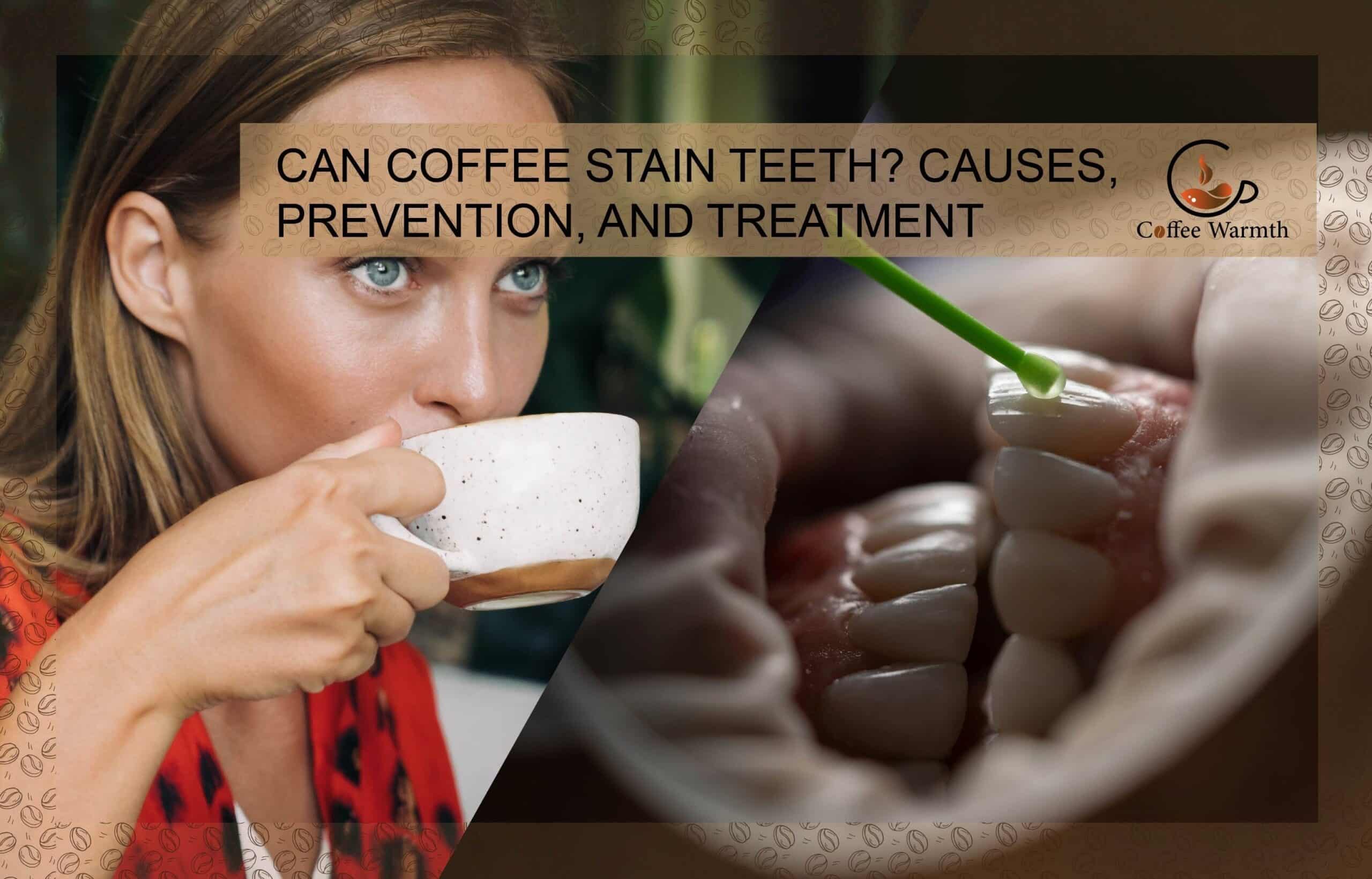Yes, coffee can stain teeth, though you need to drink it regularly for a few months to see some visible pigmentation. Drinking coffee causes teeth stains by the action of chemical compounds called tannins which convert normal teeth color to brown or yellow. The harmful effect of tannins in coffee magnifies further if you have milk and sugar in your coffee.
Drinking coffee can also erode enamel and degrade the vital dental structures. This leads to cavities and gaps for coffee to penetrate. Coffee penetrates the gaps created by cavities and leaves a sign of pigmentation. However, coffee stains are not permanent. They can be removed with home or professional whitening procedures.
As prevention is better than cure, you should try to prevent coffee from staining your teeth by drinking coffee with a straw and brushing and flossing regularly. Moreover, it is recommended to drink coffee after brushing your teeth because brushing after drinking coffee spreads acidic coffee all over your teeth.
How Does Drinking Coffee Stain Teeth?
Drinking coffee stains teeth by the action of tannins present in coffee. Tannins are used to dye fabric. So, if tannins can dye clothes, they can certainly stain the teeth.
Tannins are naturally occurring polyphenols that bind to and precipitate proteins. The amount of tannins in green coffee beans are 6.6 mg/g and roasted coffee beans are 18 mg/g, as found by Hannu Savolainen from Institute of Occupational Health Sciences, University of Lausanne. Although small in amount, tannins stain teeth in regular coffee consumers.
Drinking coffee contains metals like potassium, magnesium, iron, manganese, zinc, strontium, nickel, and cadmium as found by inductively coupled plasma mass spectrometry (ICP-MS) done by Sinai HC Manno and colleagues of City University of Hong Kong. Katica Prskalo, from University of Zagreb, and her colleagues conclude in a study that calcium, magnesium, iron, copper, and zinc traces found in coffee discolor teeth. Katica further discusses that iron, manganese, and nickel in liquid solutions like coffee can cause brown, black, or green pigmentation of enamel.
The diagram below shows both metals and tannins found in coffee that leads to teeth staining.
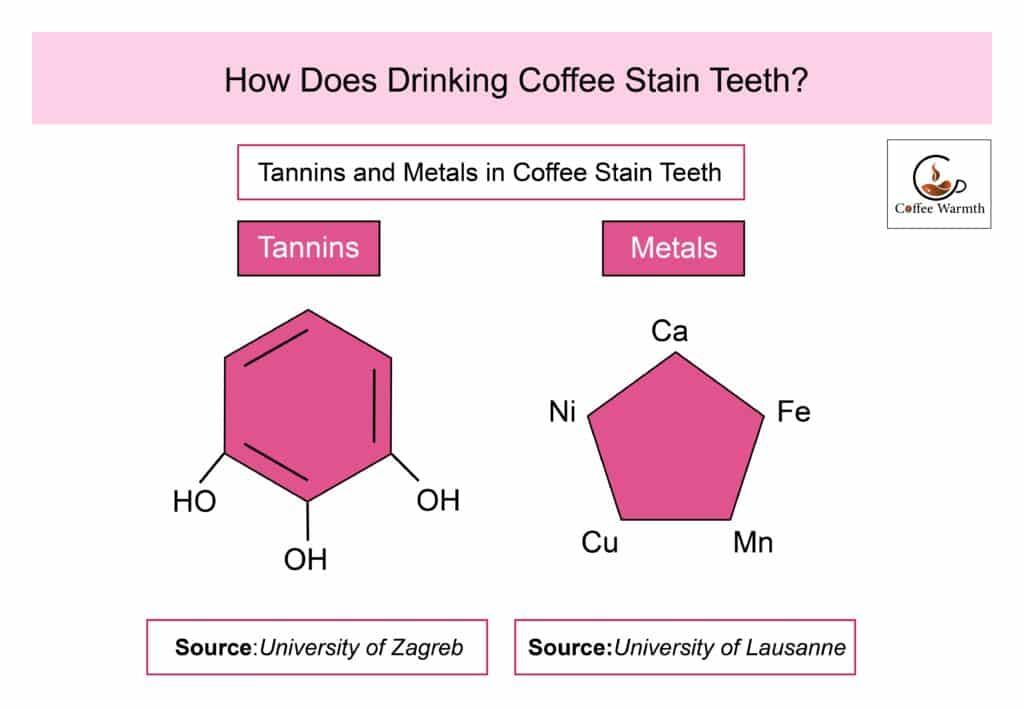
Enamel of the teeth has ridges which allow coffee to penetrate within. Coffee penetration in the ridges causes brown or black discoloration of the enamel, according to a study published in the Journal Talanta.
Furthermore, drinking coffee after bleaching can cause recurrent teeth staining due to disintegration of enamel and tooth proteins, according to Dr. Muhammet Karadas from Recep Tayyip Erdogan University.
Does Drinking Coffee Erode Enamel?
Yes, drinking coffee erodes enamel.
Enamel is the hardest substance in your body but drinking coffee can erode it through its low pH and demineralization effect. Enamel has structural ridges that allow penetration of coffee drinks. The penetration of coffee in these ridges stains the deep teeth structures and causes discoloration.
As coffee is acidic, it lowers the salivary pH which has the function to protect the dental structures. Low salivary pH softens the enamel and causes decalcification which leads to structural disintegration and erosion of enamel, as stated in a study published in the American Journal of Orthodontics and Dentofacial Orthopedics. The structural degradation of enamel causes more teeth staining. It allows coffee not only to penetrate the deep structures but also to facilitate tannins to bind strongly to teeth and turn them yellow.
The block diagram shown in the image below shows how drinking coffee can erode enamel.
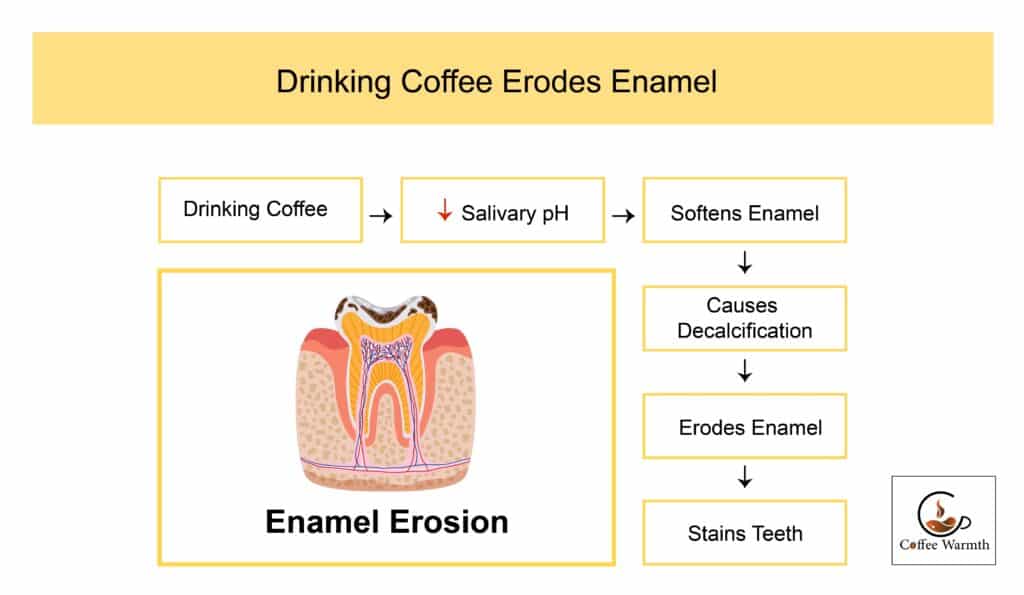
Sinai HC Manno and colleagues of City University of Hong Kong found that drinking coffee also decreases carbon-containing elements while increasing magnesium and potassium which facilitate erosion of the enamel and consequent teeth staining.
Does Drinking Coffee Cause Cavities?
Yes, drinking coffee causes cavities.
Drinking coffee causes cavities because the acidity of coffee softens and erodes the enamel surface. Domenick Zero, from School of Dentistry, Indiana University says that total acid level of coffee determines the extent of enamel erosion and risk of cavities. The disintegration of enamel leads to cavities or even tooth decay.
Drinking coffee may malfunction calcium metabolism and cause decalcification of teeth. Decalcification affects enamel health making teeth prone to cavities, according to In-Seok Song Professor at Dental Section of Korea University.
Furthermore, drinking coffee with sweeteners promotes bacterial growth that breaks enamel and dentin. Damage to enamel and dentin promotes development of dental cavities, according to a systematic review published in Frontiers Nutritional Epidemiology section.
Can Coffee Make Your Teeth Yellow?
Yes, coffee can make your teeth yellow. Tannins present in coffee turn teeth yellow as tannins are powerful dyeing agents.
Creamer, milk, cream, and sweeteners give tannins a surface to attach to and increase the risk of yellow teeth. Drinking coffee with sugar has the most risk for yellow teeth as sugar has affinity to form dental plaques, according to a study published in the Journal ‘Research Caries’.
Presence of calcium, magnesium, iron, copper, and zinc in trace amounts on (ICP-MS) in coffee also indicates high chances of discoloration and yellowness of teeth, as mentioned by a study published in the Journal Talanta.
How Much Coffee Can Stain Your Teeth?
Drinking one cup (8 fl. oz.) of coffee regularly for a few months can be enough to stain your teeth. The amount of coffee that can stain your teeth depends on every individual’s oral health. Individuals with poor oral health i.e., with excess dental plaques and tartar have already low salivary pH and the acidic nature of coffee further augments it. The resulting acidity makes your teeth more prone to staining.
The figure shown illustrates the amount of coffee than can stain your teeth.
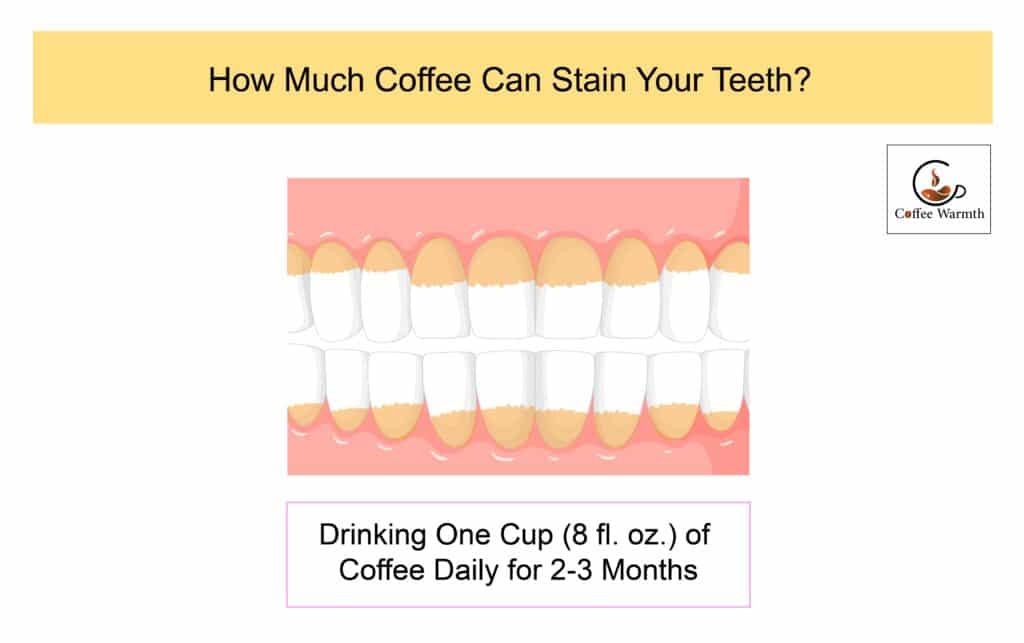
A study done in Padjadjaran University found that immersing teeth for 30 seconds three times a day for 7 days causes stains on mandibular first-premolars.
Another study published in the Journal of Medicinal Food examined teeth staining of 50 incisor teeth. Teeth were immersed in coffee for 24 hours for 5 days. The results showed severe staining due to the acidic nature of coffee.
Are Coffee Stains on Teeth Permanent?
No, coffee stains on teeth are not permanent. They can be removed with professional cosmetic procedures like laser teeth whitening, LED teeth whitening, teeth whitening kits, custom-fit tray bleaching or home procedures like whitening toothpastes, whitening strips, gels, pens, mouthwashes, and bleaching.
A single whitening treatment by a dentist improves the white color of teeth up to eight shades, according to the American Academy of Cosmetic Dentistry.
Coffee stains on teeth are removed efficiently by at-home bleaching done one hour per day for 21 days, according to a study published in the Journal of the American Dental Association.
Another study published in the International Journal of Clinical Preventive Dentistry concludes that using whitening toothpaste for 10 days at 90 strokes per minute, 2 minutes per day, and 3 times per day inhibits and removes coffee stains.
How To Prevent Coffee Stains On Teeth?
You can prevent coffee stains on teeth by drinking coffee through a straw, adding milk to the coffee, drinking coffee in one sitting, limiting coffee intake, and brushing and flossing regularly. The image below lists the ways to prevent coffee stains on teeth.
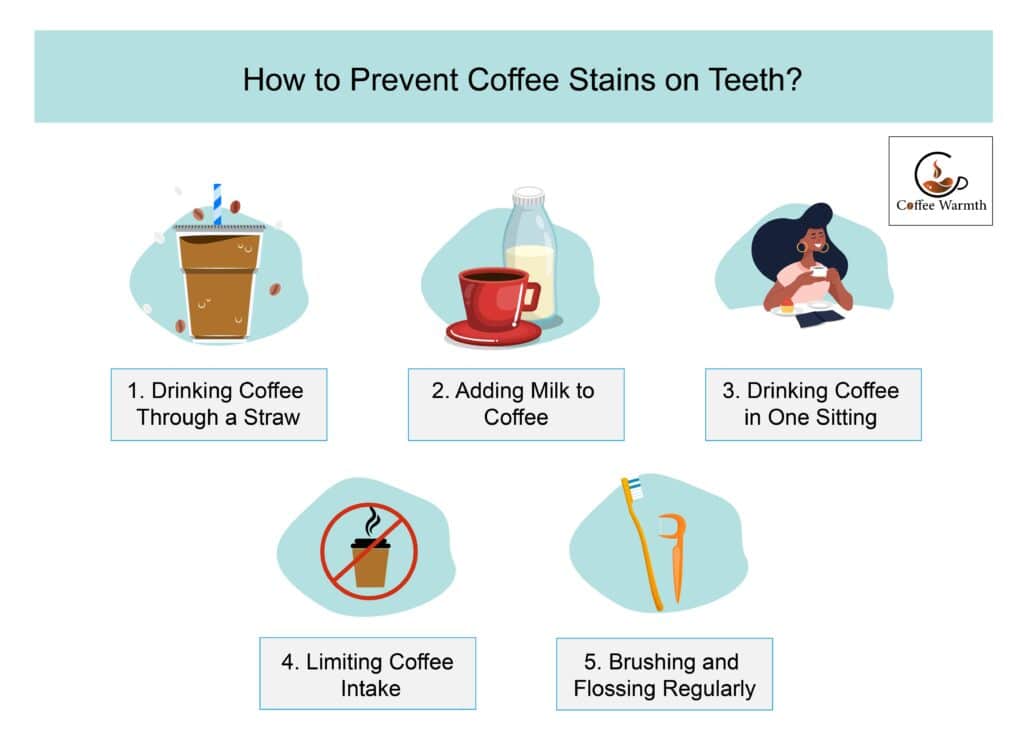
- Drinking coffee through a straw
Drinking coffee through a straw prevents staining on the teeth because coffee will bypass the front teeth reducing the direct contact of enamel with tannins. Using straw is not foolproof because coffee can still cause stains on the back of teeth.
- Adding milk to the coffee
Adding milk to the coffee reduces the staining because milk neutralizes the acidic compounds of coffee. A study in The International Journal of Dental Hygiene states that protein casein found in milk attaches to tannins, a type of polyphenol. Milk binds to the polyphenols and moves these polyphenols directly to the stomach, reducing the contact time with teeth.
- Drinking coffee in one-sitting
Drinking coffee in one-sitting is better than nursing coffee throughout the day. Sipping the same cup of coffee throughout the day increases bacteria buildup and frequency of acid attack on teeth. According to the Wisconsin Dental Association, each acid attack on teeth lasts about 20 minutes. Each sip of coffee initiates a new acid attack. So, finishing coffee in one-sitting reduces the time for coffee to cause teeth staining.
- Limiting coffee intake
Limiting coffee intake reduces polyphenol levels as the amount of caffeine in coffee equals the polyphenol levels. Low polyphenol levels cause less teeth staining. If your daily coffee intake is 3 cups, reduce it to 1 or 2 cups to prevent teeth staining.
Decaffeinated coffee has less caffeine so try this option if you’re struggling with coffee stained teeth.
- Brushing and Flossing Regularly
Brushing and flossing the teeth regularly prevents plaque buildup which reduces teeth staining. So, you can prevent coffee stains by brushing and flossing after drinking coffee. The American Dental Association recommends waiting 60 minutes after eating or drinking before brushing teeth. If you are unable to brush teeth, at least rinse your mouth with water to diminish the impact of coffee.
How To Drink Coffee Without Staining Teeth? H3
You can drink coffee without staining teeth by the following methods.
- You can drink coffee through a straw to reduce contact of acidic coffee with tooth enamel.
- You can drink coffee by adding milk to coffee as milk pushes tannins directly to the stomach reducing contact with teeth.
- You can reduce your daily caffeine intake to tear away the root cause.
How To Remove Coffee Stains From Teeth?
You can remove coffee stains from teeth by following home solutions and professional teeth whitening procedures. The following are the ways to remove coffee stains from teeth as shown in the figure.
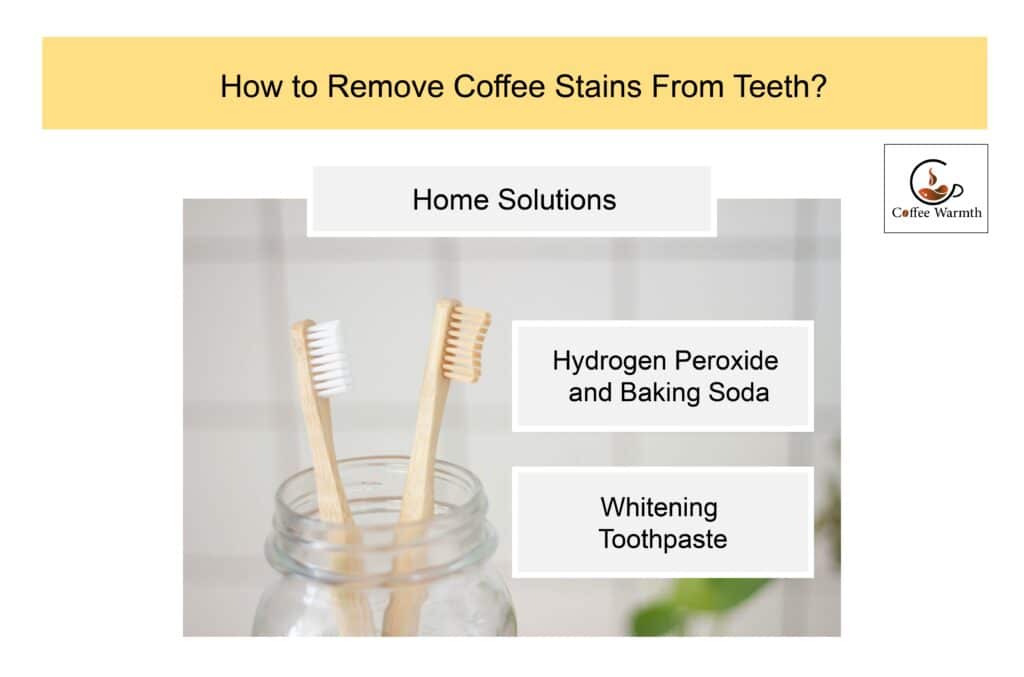
1. Home Solutions
a. Hydrogen Peroxide and Baking Soda
Home teeth bleaching with two parts of hydrogen peroxide and one part of baking soda helps remove coffee stains. Dr. Van Haywood, Department of Oral Rehabilitation, Medical College of Georgia, in his study suggests using a custom-fit hydrogen peroxide bleaching tray for 6-8 hours at night for 2-6 weeks to remove coffee stains.
b. Whitening Toothpaste
Whitening toothpaste is an easy way to remove coffee stains from teeth. Whitening toothpaste contains abrasives which work by scrubbing off coffee stains from teeth and restoring natural color according to a study published in the Journal of Dentistry.
2. Professional Teeth Whitening
Following image shows the professional teeth whitening procedures that you can adopt to remove coffee stains from teeth.
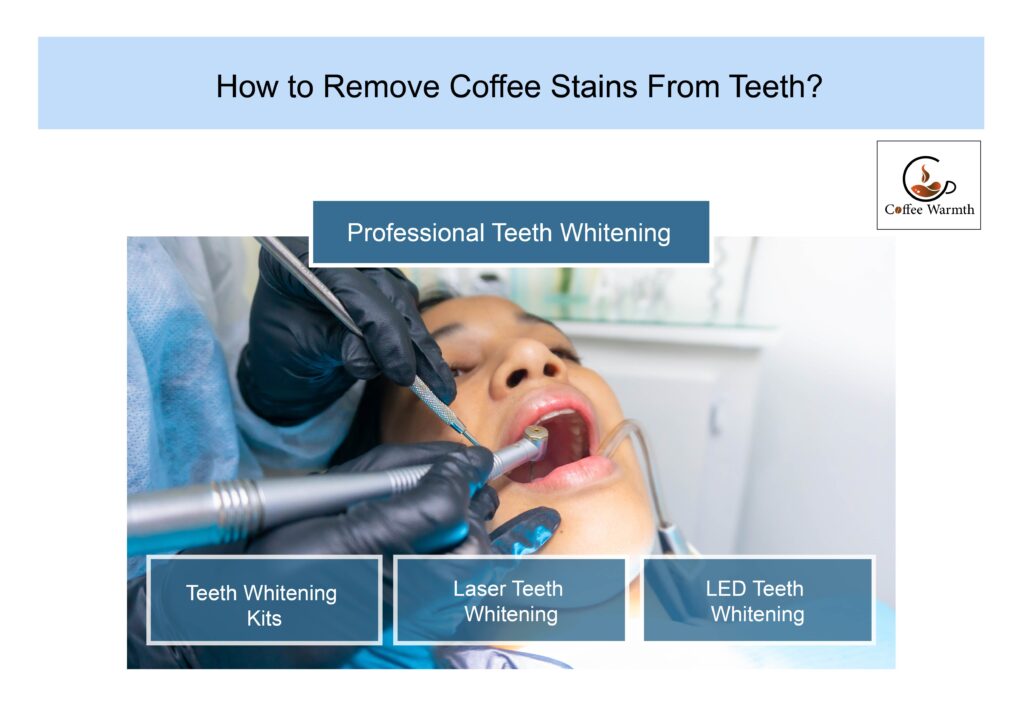
a. Teeth Whitening Kits
Teeth whitening kits containing hydrogen peroxide remove surface stains. These kits come in both strips and liquid packs. A study in the Journal of Dentistry and Oral Hygiene states that colgate and crest whitening strips eliminate coffee stains effectively.
b. Laser Teeth Whitening
Laser teeth whitening uses laser light to accelerate the bleaching process and remove coffee stains. A study in Frontiers in Dentistry concludes that laser teeth whitening is effective in reducing coffee stained teeth in a shorter time period than home solutions.
c. LED Teeth Whitening
LED teeth whitening uses LED light to activate the hydrogen peroxide bleaching gel to reduce coffee stains. Ali A Hassab and colleagues from University of Baghdad conclude in their study that LED teeth whitening effectively treats coffee stains after a 20 minutes session.
Should You Drink Coffee Before or After Brushing?
You should drink coffee after brushing your teeth because brushing your teeth removes any previous plaque. According to Dr. Huang, a dentist at Dentistry Practice Les Belles NYC, drinking coffee can stain plaque making the teeth appear darker. Brushing teeth before drinking coffee prevents coffee from sticking to the enamel. However, wait for 10 minutes after brushing your teeth to avoid toothpaste-flavored coffee.
Dr. Sonya Krasilnikov, a dentist at New York City’s Dental House, suggests waiting at least 30 minutes after drinking coffee, before brushing your teeth. Coffee is acidic and demineralizes the teeth and softens the enamel. She says if you brush right after drinking coffee you’re brushing more acid onto your teeth. This can damage your teeth causing more sensitivity that can lead to cavities.
Which Coffee Drinks Can Stain Your Teeth?
All types of coffee drinks can stain your teeth because of low pH i.e., between 4.8-6.8. The deleterious effect of each coffee drink on teeth staining from maximum to moderate to minimum is shown in the following table.
| Coffee Drink | Effect on Teeth Staining | |
| Black Coffee | Maximum | |
| Espresso | Maximum | |
| Americano | Maximum | |
| Cappuccino | Maximum to Moderate | |
| Latte | Maximum to Moderate | |
| Mocha | Maximum to Moderate | |
| Cold Brew | Maximum to Moderate | |
| Decaf Coffee | Minimum |
Does Creamer Stain Teeth?
Yes, creamer stains teeth. Adding creamer to your coffee reduces the coffee color but not the stains on your teeth as tannins in coffee are what causes the staining.
Creamer in coffee increases the chances of turning teeth yellow. This is because the creamer provides a firm surface for tannins to adhere to. Tannins adhere to the enamel surface for prolonged time period, staining teeth and gradually turning them yellow.
